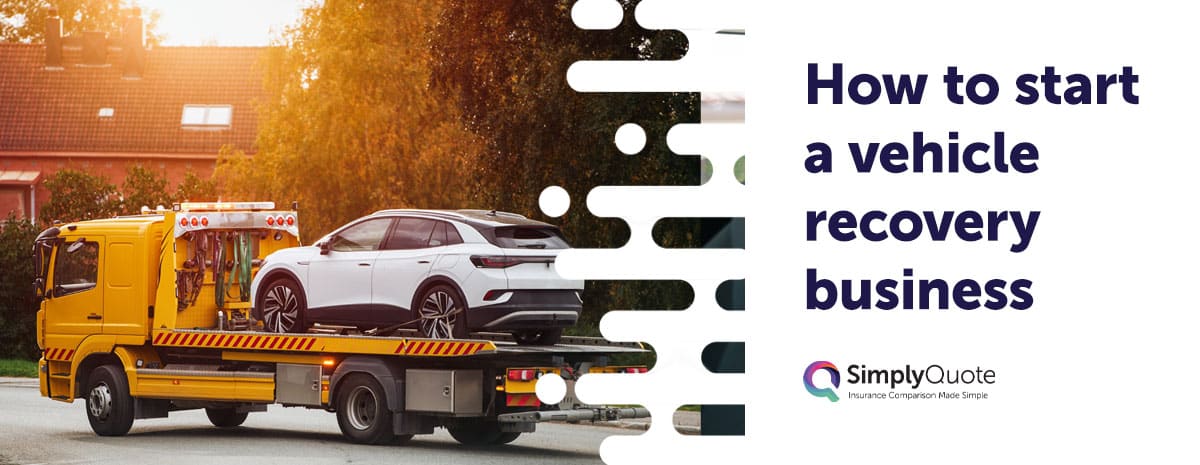How to start a vehicle recovery business in the UK
Launching a successful vehicle recovery business requires careful planning, industry knowledge, and financial investment. This guide will walk you through the essential steps, from business planning to purchasing equipment, obtaining insurance, and following UK-specific regulations.
The vehicle recovery industry in the UK is a £1.8 billion market, with projections indicating future growth from 2025 to 2030. Demand for roadside assistance remains stable, driven by rising used car sales and the increasing number of electric vehicles (EVs) requiring specialist recovery solutions.
Understanding market trends, securing the right insurance coverage, and developing a strategic business plan are crucial to success. This guide covers everything you need to establish a profitable and legally compliant vehicle recovery business.

What is a vehicle recovery business?
A vehicle recovery business provides roadside assistance and towing services for broken-down or accident-damaged vehicles.
Services typically include:
- Breakdown assistance – helping motorists whose cars have broken down.
- Accident recovery – towing vehicles involved in road accidents.
- Repossessions – retrieving vehicles on behalf of finance companies.
- Long-distance towing – transporting vehicles across the UK.
Operators must have the proper training, equipment, and insurance policies to ensure they operate legally and safely.
Looking for recovery truck insurance? Get your quote today!
Get QuotesWhy do you need a business plan?
A well-structured business plan provides direction and financial clarity. It helps you budget for start-up costs, identify potential earnings, and anticipate operational expenses.
A strong business plan outlines objectives, target market research, and financial projections. Understanding your customer base, which may include private motorists, insurance companies, and businesses, will help define your service offering.
Given that the UK roadside assistance industry generates significant revenue, new businesses can differentiate themselves by focusing on niche services such as electric vehicle recovery, superior customer service, or competitive pricing models.
A well-defined business plan ensures that new entrants can position themselves effectively and carve out a profitable niche. Furthermore, CAGR projections indicate a turnaround in growth post-2025, making this an ideal time to prepare for market entry.
Start-up costs should be carefully calculated, including vehicle purchase, insurance, licensing fees, and marketing expenses. Revenue projections should estimate earnings based on service charges and demand. Having a marketing strategy in place is also vital for business success, ensuring visibility and attracting customers.
How to purchase the right tow truck and equipment
The type of tow truck you purchase depends on the services you plan to offer.
Flatbed recovery trucks are versatile and suitable for transporting various types of vehicles safely. Wheel-lift tow trucks are more cost-effective and ideal for urban recovery services, while heavy-duty tow trucks are necessary for recovering larger vehicles such as buses and lorries.
For a vehicle recovery business to operate efficiently and safely, it is essential to have the right tools and equipment. These are just as important as the tow truck itself, ensuring smooth operations and reducing potential risks.
These include:
- Tow ropes and winches – critical for securing vehicles.
- Hydraulic jacks – assist in lifting vehicles when required.
- High-visibility jackets and cones – ensure safety when working at the roadside.
- Light bars – help alert other road users.
- Vehicle tracking system – assists in monitoring business operations efficiently.
What insurance do you need for a vehicle recovery business?
Having the right insurance policies is vital for protecting your vehicle recovery business from financial risks.
For example, if a recovery operator damages a high-value vehicle while loading it onto the truck, public liability insurance can cover the repair costs and any legal expenses. Without adequate coverage, such incidents could lead to significant financial loss or even business closure. Different types of insurance cater to specific aspects of the business, ensuring compliance and safeguarding against liability claims.
Motor Trade Insurance
Motor trade insurance covers businesses that deal with vehicles, including vehicle recovery companies. This includes recovery truck insurance, which provides specialised cover for towing and roadside assistance vehicles. It provides protection for the vehicles you own and those you recover. The three main levels of cover include:
- Third-Party Only – Covers damages to other vehicles and third parties but does not cover your own vehicles.
- Third-Party Fire and Theft – Includes third-party cover plus protection against fire and theft.
- Fully Comprehensive – Covers damages to all vehicles, including your own, regardless of fault.
Public Liability Insurance
This insurance is crucial for businesses that interact with customers and third parties. It covers claims related to injury, property damage, or legal expenses if your business is found liable. If a customer’s vehicle is damaged during recovery, public liability insurance can cover repair costs.
Employer’s Liability Insurance
If you employ staff, this insurance is legally required. It covers workplace injuries or illnesses suffered by employees and protects the business from compensation claims.
Professional Indemnity Insurance
This type of insurance protects your business against claims of professional negligence or poor service. If a vehicle is improperly recovered and incurs further damage, this policy can help cover costs.
Business Interruption Insurance
This insurance helps cover lost income if your business operations are unexpectedly halted due to an insured event, such as a serious accident, fire, or natural disaster.
Having the right mix of insurance policies ensures your vehicle recovery business remains financially secure while complying with UK regulations.
How to market your vehicle recovery business
Effectively marketing your vehicle recovery business is essential for attracting customers and securing long-term success. A well-rounded marketing strategy should include both digital and offline efforts to reach your target audience effectively.
Digital Marketing
Having a strong online presence is crucial in today’s market. Strategies to consider include:
- Search Engine Optimisation (SEO): Optimise your website for relevant search terms like ‘vehicle recovery service near me‘ to improve visibility on Google.
- Social Media Marketing: Platforms like Facebook and Instagram allow you to engage with customers, share updates, and showcase your services.
- Google My Business: Registering your business helps local customers find you more easily.
- Online Reviews: Encouraging satisfied customers to leave positive reviews boosts credibility and helps attract new clients.
Local Marketing Strategies
To reach customers in your service area, consider:
- Flyers & Business Cards: Distribute marketing materials in garages, petrol stations, and local businesses.
- Vehicle Branding: Display your company name, contact details, and branding on your recovery trucks.
- Local Newspaper & Radio Ads: These can help build awareness in your target area.
Strategic Partnerships
Collaborating with related businesses can help generate steady work. Consider partnerships with:
- Garages & Mechanics: These businesses frequently need recovery services.
- Taxi & Car Rental Companies: They may require vehicle recovery assistance for their fleets.
- Insurance Companies: Providing recovery services to insurers can create consistent business opportunities.
Referral & Customer Loyalty Programmes
Word-of-mouth is a powerful marketing tool. Encourage repeat business and referrals by:
- Offering discounts to customers who refer others.
- Providing loyalty incentives for businesses that use your service regularly.
- Ensuring excellent customer service, as positive experiences lead to recommendations.
By implementing these marketing strategies, you can build a strong reputation, attract more customers, and establish a profitable recovery business.
Expert tips for running a profitable recovery business
Running a successful vehicle recovery business requires strategic planning and operational efficiency. Here are key areas to focus on to maximise profitability and long-term growth:
1. Manage Costs Effectively
- Optimise fuel usage with route planning technology to reduce expenses.
- Invest in fuel-efficient and well-maintained recovery trucks to lower running costs.
- Regular servicing and preventative maintenance help avoid costly repairs and downtime.
2. Offer Competitive Pricing
- Research local competitors and ensure your pricing is competitive yet profitable.
- Introduce flexible pricing structures, such as flat rates for local recoveries and per-mile charges for long-distance tows.
- Consider offering discounts for repeat customers and business contracts.
3. Build a Strong Brand & Reputation
- Prioritise excellent customer service, as word-of-mouth recommendations are crucial in this industry.
- Encourage online reviews and testimonials to build credibility.
- Invest in professional branding, including clear signage on vehicles and uniforms for staff.
4. Diversify Revenue Streams
- Offer specialist recovery services for electric vehicles (EVs), as demand for this is rising.
- Provide vehicle storage solutions for insurers or finance companies needing secure locations.
- Expand into breakdown assistance memberships or partnerships with local taxi and rental firms.
5. Improve Operational Efficiency
- Use fleet management software to track jobs, reduce idle time, and improve dispatching.
- Invest in real-time tracking technology to improve response times and customer satisfaction.
- Train staff in safe and efficient recovery techniques to prevent costly damages or legal issues.
By implementing these strategies, you can create a profitable, resilient, and customer-focused vehicle recovery business. Additionally, the rising popularity of used cars—reaching a five-year high in early 2024—further boosts demand for recovery services. Adapting to the increasing number of electric vehicles (EVs) and understanding their unique recovery requirements will be crucial for future success.
Running a profitable vehicle recovery business requires a balance of cost management, competitive pricing, and operational efficiency. Implementing fuel-efficient route planning, regular vehicle maintenance, and strategic pricing helps maximise profits without compromising service quality. Additionally, maintaining strong branding and excellent customer service enhances reputation and encourages repeat business.
Frequently Asked Questions (FAQs)
The initial investment depends on vehicle choice, insurance, equipment, and licensing. Costs typically range from £15,000 to £50,000.
Yes, an Operator’s Licence is required for recovery vehicles exceeding 3,500kg.
Employer’s liability insurance is mandatory if you have staff. Motor trade and public liability insurance are also strongly recommended.
Utilise local SEO, social media marketing, and partnerships with garages and insurers to increase visibility and acquire more clients.
